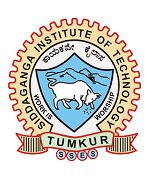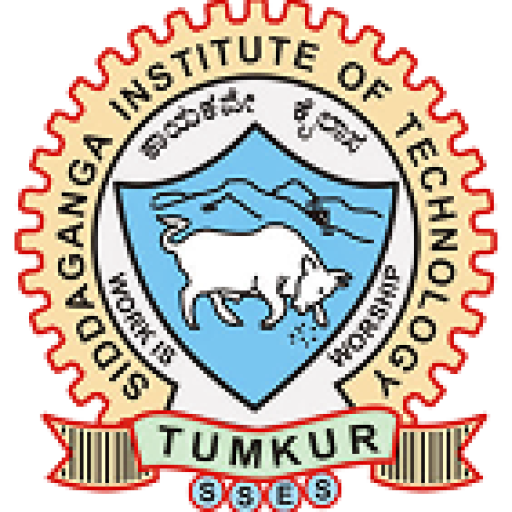Department of Electrical & Electronics Engineering
Overview
The Department of Electrical & Electronics Engineering at Siddaganga Institute of Technology (SIT) has been a key pillar of the institute since its establishment. Over the years, the department has grown into a center of excellence in electrical engineering, power systems, electronics, and embedded systems, providing students with a strong theoretical foundation and hands-on practical exposure. The department is recognized for its quality education, research contributions, and industry collaborations.
Program Details
Undergraduate Program:
- B.E. in Electrical & Electronics Engineering
Duration: 4 Years
Focuses on core areas such as electrical circuits, power systems, control systems, embedded systems, power electronics, and renewable energy technologies.
Postgraduate Programs:
- M.Tech in Power & Energy Systems
Advanced study in areas like smart grids, power system optimization, renewable energy integration, and energy management.
Ph.D.
- The department also offers Ph.D. programs in various research areas such as power electronics, high-voltage engineering, IoT in energy systems, automation, and electrical drives.
Vision & Mission
Vision
“To be a premier department in Electrical & Electronics Engineering, offering quality education and research in cutting-edge technologies while fostering innovation for the betterment of society.”
Mission
To provide a strong foundation in electrical and electronics engineering principles for students across disciplines.
To encourage research and innovation in emerging areas such as smart grids, IoT, power electronics, and automation.
To promote professional ethics, leadership, and problem-solving skills among students.
To collaborate with industries and research organizations for practical learning and technology advancements.
Student Life & Activities
Electrical Engineering Club – Organizes technical talks, hackathons, and industry visits.
Workshops & Seminars – The department regularly hosts sessions on emerging technologies like IoT, AI in power systems, and smart grids.
Project Exhibitions – Encourages students to showcase innovative electrical engineering solutions.
Infrastructure & Facilities
The Electrical & Electronics Engineering Department is equipped with state-of-the-art laboratories and research facilities:
Laboratories:
Power Electronics & Drives Lab – Focused on motor drives, inverters, and energy-efficient control systems.
High Voltage & Insulation Lab – Equipped for testing electrical insulation and high-voltage equipment.
Embedded Systems & IoT Lab – Enables hands-on experience with microcontrollers, IoT devices, and automation.
Electrical Machines Lab – Provides training in motors, generators, and transformers.
Research Labs:
Renewable Energy Research Lab – Works on solar, wind, and hybrid power generation systems.
Smart Grid & Automation Lab – Focuses on modern power distribution and control technologies.
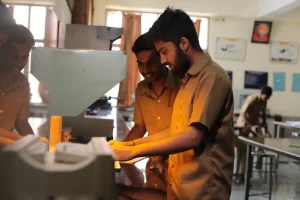
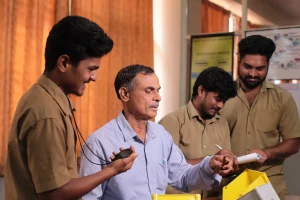
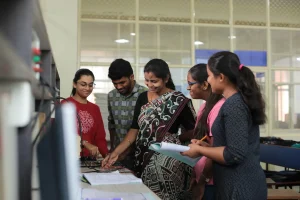
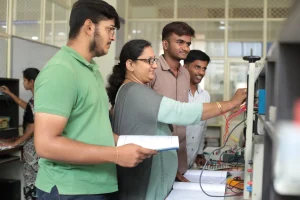
Faculty
The department has highly qualified and experienced faculty members specializing in power systems, electrical machines, control systems, IoT, and embedded systems. Faculty members actively engage in research, consultancy projects, and industrial collaborations.
Academic Programs & Syllabus
-
Undergraduate Program:
- B.E. in Electrical & Electronics Engineering
Duration: 4 Years
-
The B.E. program provides students with a strong foundation in electrical circuits, power systems, control systems, power electronics, embedded systems, and renewable energy technologies, preparing them for successful careers in core electrical industries, automation, and interdisciplinary fields.
- B.E. in Electrical & Electronics Engineering
-
Postgraduate Program:
-
M.Tech in Power & Energy Systems
Advanced study in areas like smart grids, power system optimization, energy management, and renewable energy integration.
-
-
Ph.D.
The department also offers postgraduate and doctoral programs, with research opportunities in power electronics, electrical drives, IoT in energy systems, automation, and high-voltage engineering
Syllabus
Program Educational Objectives (PEOs) - UG
Graduates of the Electrical & Electronics Engineering program will:
Apply engineering knowledge and analytical skills to solve real-world electrical challenges.
Pursue higher education and research in advanced fields of electrical and electronics engineering.
Demonstrate leadership, teamwork, and communication skills in professional environments.
Contribute to technological innovations and sustainable energy solutions while adhering to ethical standards.
Program Outcomes (POs) - UG
Graduates will be able to:
Apply fundamental and advanced concepts of electrical engineering to design efficient systems.
Utilize modern tools and technologies in power systems, automation, and electronics.
Conduct research and problem-solving in electrical and energy-related domains.
Demonstrate professional ethics, lifelong learning, and adaptability to technological advancements.
Industry Collaboration & Placement
The department has strong industry partnerships, offering students opportunities for internships, projects, and placements in leading companies. Graduates are placed in top organizations such as:
ABB, Schneider Electric, Siemens, Tata Power, L&T, General Electric, Wipro, Infosys, Accenture, and Bosch.
Achievements & Recognition
The department has published numerous research papers in reputed national and international journals.
Faculty members have received grants for research projects in power systems, automation, and energy efficiency.
Over 80% of students secure placements in core and software industries, and 20% pursue higher studies.
The department actively contributes to consultancy services and industry-driven research projects.
Alumni Success
The department offers B.E. in Electrical & Electronics Engineering with admissions through CET, COMED-K, and JEE Mains. For postgraduate programs, candidates can apply based on academic qualifications and research interests. For more details, visit the Admissions Page.
Admissions
The B.E. in Computer Science and Engineering program admits students based on CET, COMED-K, and JEE Mains entrance exam scores. For postgraduate programs, candidates can apply based on their academic qualifications and research interests.
